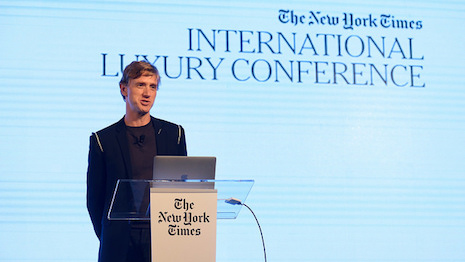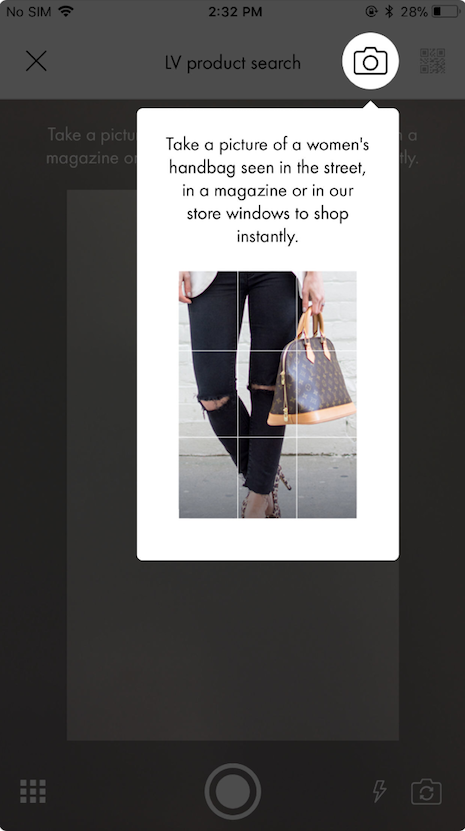 LVMH brands are working to make online shopping a more luxurious experience. Image credit: Louis Vuitton
LVMH brands are working to make online shopping a more luxurious experience. Image credit: Louis Vuitton
HONG KONG – For too long, luxury brands have operated as if there is still a distinction between the online and offline worlds instead of accepting that affluent shoppers seek out personalized, omichannel experiences.
As the adoption of artificial intelligence and other technology makes even mass-market brands able to effectively market to individuals, luxury brands need to maintain the advantage of personal connections. During a keynote at The New York Times International Luxury Conference on Nov. 12, an LVMH executive described his role as translating between the worlds of luxury, culture and ecommerce.
“What are we really talking about when we talk about digital?” said Ian Rogers, chief digital officer at LVMH. “We’re talking about humans evolving and having high-speed computers with Internet connections in their pockets.”
Elevating ecommerce
As the luxury goods business pivots to incorporate digital into many brands' strategies, ecommerce is proving to be a significant growth driver.
In the second quarter of 2018, increases in online sales of luxury goods outpaced the overall luxury growth, according to research from First Data. Jewelry, women’s accessories and specialty apparel were the biggest categories (see story).
Today’s shoppers empower themselves by using smartphones in stores, a shift from a decade ago.
According to a report from Boston Retail Partners, 46 percent of all consumers across all generational age groups use their mobile devices to compare prices, check inventory and read product reviews. Meanwhile, retailers have devoted resources to building store locators, virtual shopping lists and enabling social sharing of products — features that shoppers seldom use (see story).
LVMH's Ian Rogers speaking at The New York Times International Luxury Conference. Image credit: C.K. Man for The New York Times
Too often, Mr. Rogers finds that brands focus on the technology instead of building technology to suit the customer. Tech capabilities are not what draws in customers, but they do shape shoppers' experiences.
“Our job isn’t to bring luxury online,” Mr. Rogers said. “It’s to make online shopping luxury.”
Mr. Rogers cited Tmall’s Luxury Pavilion as one platform that offers a separation between luxury and mass market.
To better serve luxury brands, Alibaba's Tmall launched an invite-only platform, Luxury Pavilion, in late 2017. In keeping with the luxury theme, the platform allows brands to create much more robust and unique experiences that match with the luxury shopping experience in-store but applying it to a digital space (see story).
Louis Vuitton's visual search. Image credit: Louis Vuitton
LVMH's Louis Vuitton is enhancing its mobile shopping experience through an updated application.
Among the additions to Louis Vuitton’s app is visual search, which enables consumers to snap a handbag or garment that catches their eye in a magazine or on a passerby to find it in the brand’s catalog. Mobile has become an important channel for reaching luxury consumers, enabling brands to engage with their clients anywhere they are (see story).
Luxury innovations
While luxury brands should not necessarily be at the front lines of innovation, if they are too slow to adapt, other brands will move in.
Ecommerce platform Farfetch has been successful at disrupting the luxury fashion space.
Farfetch’s business model has helped not only itself, but also its partners. The platform, as well as others that are similar to it, has helped the luxury business better capture the potential of online channels, assisting heritage brands with long histories more easily navigate digital tools.
Working with its network of more than 980 global boutiques allows Farfetch to have a significant supply chain, which is both beneficial for the ecommerce platform and bricks-and-mortar store (see story).
LVMH created a new accelerator program focused on supporting innovators in the luxury world at Station F, a large startup campus in Paris.
Called La Maison de Startups, the program will focus on fostering innovative new startups in the industry while also allowing those startups to communicate and work with LVMH’s brands. The program will welcome 50 startups over the course of two years in six-month terms (see story).
“Customers are much savvier than we give them credit for,” Mr. Rogers said. “If we don’t provide our customers with those [innovative] experiences, someone else will.”


